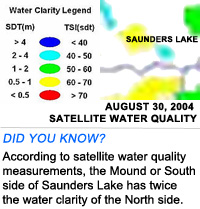|
 Saunders Lake Homeowners Resources: Saunders Lake Homeowners Resources:
Water Quality Links
University of Minnesota Extension Service
offers a great program for lakeshore homeowners.
Minnesota Lakes Association provides many
resources for lakeshore homeowners.
The Minnesota Shoreland Management Guide is
a comprehensive website that covers numerous topics including how to prevent
lawn fertilizer from causing algae blooms and choking weeds.
Minnesotans For Healthy Lakes works with
the Department of Natural Resources to attempt to obtain, or maintain,
reasonable rules that balance the rights of lakeshore property owners with
the obligation we all have to protect our precious water resource.
Boating Regulations
Saunders Lake does not have
any boating or motor regulations.
Here is the DNRs official list of Metro
lakes with boating regulations.
Environmental Lake
Saunders Lake is classified
by the Minnesota DNR as an Environmental Lake. From the DNR: "The
term 'environmental lake' most likely is taken from the Natural Environment
lake classification found in Minnesota's Shoreland Management Program. Many
people mistakenly infer that the Natural Environment classification on many
of Minnesota's smaller, shallow lakes means they are wild lakes with limits
on motors, hunting or fishing. The classification has nothing to do with
surface water use of boats or motors, hunting and fishing or fish
management."
Here is the full definition.
 Lake Issues
- Water Levels and the Pedestrian Bridge Lake Issues
- Water Levels and the Pedestrian Bridge
Since 2002, water levels on Saunders have fluctuated from abnormally low to
abnormally high due to a combination of an improperly functioning outlet and
culvert. At times, the high water has
violated the
3 foot clearance rule under the pedestrian
bridge making it impassable. Low water levels have been even more
destructive (7/7/03
Page 4). The outlet and culverts are maintained by the city of Minnetrista. According to the
public works superintendent of Minnetrista, the culverts and outlet will be looked at once per month to make certain
everything is functioning correctly (03/06/2006). Background: Per the
MCWD: Drainage is conveyed through the subwatershed through a series of
culverts and channels that should be evaluated, monitored, and replaced or
repaired as necessary to maintain conveyance, minimize erosion, minimize
hydrologic bounce, and maintain adequate water levels in lakes and wetlands.
The HHPLS and Regional Team input identified three in particular that
exhibited some need for maintenance: the Saunders Lake outlet; the Black
Lake outlet; and the culverts under the railroad berm.
Source: Dec 31, 2005 D R A F T-3 Langdon Lake
Subwatershed Page 33
 Please
contact us if you notice unusually
low or high water levels. Please
contact us if you notice unusually
low or high water levels.
<Home |

